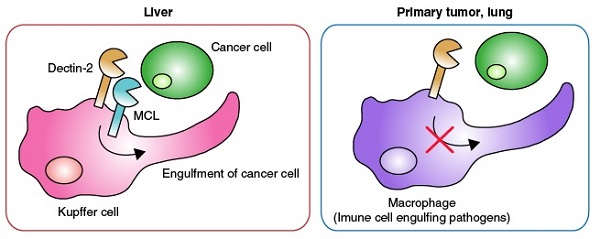Newly discovered mechanism prevents spread of cancer to liver Dectin-2 protein promotes anti-tumor innate immune response


Mechanism by which Dectin 2promotes removal of cancer cells by Kupffer cells
Dectin-2 promotes phagocytosis of cancer cells by Kupffer cells, working in tandem with MCLto ward off liver metastasis.. On the other hand, tumors found at the site where they originated (primary tumors) and lung metastasis do not trigger such immune response.
© 2016 Yoshitaka Kimura.
University of Tokyo researchers and their collaborators have demonstrated that one of the key proteins for immune response, the Dectin-2 receptor, helps prevent cancer cells from spreading to the liver. The current findings provide a new insight for developing novel cancer treatments in which phagocytosis—the process whereby the immune cells engulf and remove cancerous ones—comes into play.
Metastasis, the spread of cancer from one part of the body to another, is a major cause of mortality in cancer patients. Among various types of metastasis, the spread of disease to the liver is common among many kinds of cancer and often has a poor prognosis. The immune system plays a critical role in stemming liver metastasis, but the mechanism by which it does so is largely unknown.
In the current study, by using Dectin-2-deficient mice, the research group led by Project Researcher Yoshitaka Kimura and Professor Tadatsugu Taniguchi at the University of Tokyo’s Institute of Industrial Science revealed that the Dectin-2 receptor, which acts as a key component in the immune system’s removal of disease-causing agents, suppresses cancer development. The researchers found that the Dectin-2 receptor, a protein that expresses itself on the cell membrane, promotes the engulfment of cancer cells by what are known as Kupffer cells that contribute to clearing foreign material from the liver, to hold back the spread of cancer. Interestingly, this immune response was not observed in mice with tumor growth under the skin or lung metastasis, indicating that the immune response is triggered selectively in the liver. Moreover, the group found that MCL, a receptor known to bind with Dectin-2, works with it to suppress liver metastasis.
“Dectin-2 is well-known for the key role it plays in protecting against disease-causing agents such as the Candida fungus,” says Taniguchi. He continues, “I found it very intriguing that the protein serves an important function in eliminating cancer cells, as well.”
The current study was carried out in collaboration with Chiba University Associate Professor Shinobu Saijo, Kyushu University Professor Sho Yamasaki, and Tokyo University of Science Professor Yoichiro Iwakura.
Paper
, "The innate immune receptor Dectin-2 mediates the phagocytosis of cancer cells by Kupffer cells for the suppression of liver metastasis", Proceedings of the National Academy of Sciences Online Edition: 2016/11/22 (Japan time), doi: 10.1073/pnas.1617903113.
Article link (Publication)
Links
Institute of Industrial Science
Department of Pathology, Immunology and Microbiology, Graduate School of Medicine (Japanese)
Department of Molecular Immunology, Institute of Industrial Science







